By Elmer Schialer, Minister of Foreign Affairs of Peru
In an international scenario marked by complexity and global challenges, strengthening bilateral cooperation is essential for shared sustainable development. As I reflect on the evolving relationship between Peru and Kuwait, I am filled with optimism about the future we can build together. Despite the geographic distance, Peru and Kuwait share a common vision rooted in economic cooperation. Our countries are united not only by rich histories but by a shared commitment to global integration and the principles of sustainable development.
Strategically located on the Pacific coast of South America, Peru serves as a gateway to regional and global markets. With a population of over 34 million and a territory spanning 1.28 million square kilometers, Peru stands out as a model of macroeconomic stability and a regional leader in trade and investment. In 2024, the country registered GDP growth of 3.3 percent, maintained inflation at 1.9 percent, and achieved record exports totaling $74.664 billion. This trade-driven growth is supported by 22 Free Trade Agreements and 32 Bilateral Investment Treaties. Peru’s resilience and openness make it an attractive destination for Kuwaiti investors.
In addition, Peru’s robust maritime infrastructure positions it as a key logistics hub in Latin America, ranking third in the region on the Maritime Transport Connectivity Index. The port of Callao continues to expand its capacity, while the inauguration of the port of Chancay will further integrate Peru into global supply chains and strengthen its strategic role in international trade.
This increased logistical integration is in line with Peru’s foreign policy, which is defined by its commitment to international law, economic integration and openness to the world. As a founding member of both the Andean Community and the Pacific Alliance, and as host of the APEC 2024 Forum, Peru has positioned itself as a key player in international economic cooperation. These attributes provide a solid platform for foreign investors, including Kuwaiti companies, to expand their economic and commercial presence in South America.
The bilateral relationship between Peru and Kuwait began in 1975 with the establishment of diplomatic relations. A milestone in strengthening these ties was the reopening of Peru’s embassy in Kuwait in 2011, marking a renewed commitment to bilateral engagement. Since then, economic and political cooperation has advanced, supported by the Political Consultation Mechanism, which facilitates dialogue and the negotiation of new agreements. Notable developments include the project of the Air Services Agreement, the project of the Promotion and Reciprocal Protection of Investments Agreement, and the project of the Avoidance of Double Taxation Agreement.
As I prepare to visit Kuwait, I do so with genuine anticipation and a deep sense of purpose. I am honored to represent Peru in a country known for its leadership, vision, and enduring commitment to progress. Kuwait’s “Vision 2035” resonates strongly with our own national development goals. We share not only economic interests — in infrastructure, energy, mining and agribusiness — but also a common desire to promote sustainable growth and food security for our people. I believe that this alignment creates a powerful foundation for a long-lasting partnership.
I am particularly inspired by the possibilities that lie ahead. Kuwait’s expertise and the global reach of institutions like the Kuwait Investment Authority offer immense potential for collaboration. I am convinced that by working together, we can create real impact — opportunities that translate into jobs, innovation, and better living conditions in both our nations.
Peru offers a wide portfolio of investment opportunities, particularly in infrastructure development and energy modernization. Key projects include the Southern Peru Integrated Gas Transportation System and Groups 2 and 3 of the 2025-2034 Transmission Plan in the energy sector; the Los Chancas and La Inmaculada mining projects; the National Fiber Optic Backbone Network in telecommunications; and, in infrastructure, the Pucallpa Port Terminal and the Hipólito Unanue National Hospital. For Kuwaiti investors, these large-scale initiatives represent unique opportunities to participate in public-private partnerships (PPPs), contributing to Peru’s economic transformation while ensuring stable and profitable returns.
Peru and Kuwait are forging a long-term relationship that goes beyond traditional diplomatic engagement. As I witness this growing partnership, I am deeply excited by the potential it holds for both our nations. This evolving bilateral relationship is grounded in economic complementarity, shared development goals, and a strong commitment to international cooperation. Peru wholeheartedly welcomes Kuwaiti businesses, investors, and policymakers to explore the many opportunities that this dynamic partnership offers. Together, both countries can unlock new economic frontiers and build a lasting framework for shared growth and prosperity.


















